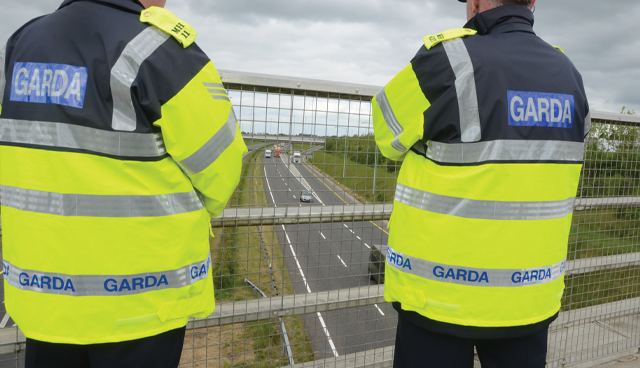
The last decade has been one of upheaval for the talent management and human relations sectors of An Garda Síochána, one where Gardaí and civilian staff have finally been integrated into one organisation, falling under one HR Directorate. Director of HR Alan Mulligan speaks to Odrán Waldron about that process, protected disclosure and future reforms for Garda HR.
“We’re nearly finished a new organisational design as part of the Garda Modernisation and Renewal Programme that will determine the number of regions and divisions we’ll have. That’s coming to an end and the Garda Commissioner [Drew Harris] will make announcements on that when it’s ready. We worked with Deloitte and designed a new HR operating model. That’s a huge thing for us and a big challenge,” Alan Mulligan says, reflecting on the latest step in what has been a long and overdue overhaul of how An Garda Síochána manage the staff, both Gardaí and civilians, in their ranks.
Those ranks are set to grow, Mulligan details: “The other big challenge is that we are increasing the size of the organisation to 21,000 people. That’s going to give us 15,000 Gardaí; we had 13,000 when this process started. We’re doubling the number of civilian staff, going from 2,000 to 4,000 full-time equivalent and are going to bring the number of reserves, which is around 600 at the moment, up to around 2,000, which we hope to have done by 2021. At the moment, we have about 14,000 Gardaí, having increased by 1,000 and we’re in line to reach that 15,000 figure. Civilian staff full-time equivalent number is just over 2,700 and we’re in line to reach our goal there too.
“Reserve recruitment is a new strategy that we’ve just finished and sent to the Department of Justice and the Policing Authority and we’ll start recruiting once that’s passed. The HR operating model is huge and is partly based on the Ulrich model. We have each division headed up by a Chief Superintendent who will have a team of HR people for themselves. We have communities of expertise as they are called; the Garda College is a good example with them being training experts. We’re building up a capacity at Principal Officer level – the last two Principal Officers were brought in on a specific HR panel, they weren’t just general civil servants.”
One of those recent appointments has been placed in charge of talent acquisition, while the other is now based in Navan’s Athlumney House, where Garda HR was decentralised to after the founding of the Civilian HR Directorate that was eventually integrated, in charge of administrative and transactional issues. “It’s going to change how we do things; once we have our structure and our governance in place, we need to develop a system,” Mulligan says.
Such heavy and sustained recruitment, along with the specific qualities needed to be a Garda mean that the organisation has had to also redesign and perfectly define what it is they are looking for in prospective Gardaí. “We work closely with the Public Appointments Service to bring in Gardaí and over the years we have done various exercises with them in relation to what qualities you need in a police officer and the competitions they lead would have been designed around those attributes,” Mulligan says. “They’ve only recently done a review of that with us and that will come in for future competitions.”
Reviews have been part and parcel of Mulligan’s experience within An Garda Síochána since joining from the Department of Justice in 2006. A review group set up by former Garda Commissioner Fachtna Murphy in 2007 reviewed training and development and Mulligan says that “one of the big issues we zoomed in on was ensuring we get the excellent people that we want for policing. The new programme has been designed out of that”.
“We’re working on it all the time. The Commission for Policing has done some great work, the Department of the Taoiseach, Department of Justice and Department of Public Expenditure and Reform are involved, and we work very closely with them,” he says. “One of our tasks arising from all this reform is to bring in an expert in training and development, not just for trainees but for people at every stage of their careers. Training is so important in a police organisation. On the civilian side, we drew down from the Public Appointments Service and general appointments but have started now to specialise a little bit more. The other skilled people we bring in, such as accountants or crime and policing specialists are very much bespoke appointments in specialised competitions.”
The staff at the time were falling between two stools; working for the Gardaí while being the responsibility of the Department. I think there’s been a lot of benefits for civilian staff. The unions saw that and represented the interest of their members.
All of this is still relatively new to An Garda Síochána as an organisation. The management of civilian staff only came under Garda control following the implementation of the Garda Act in 2005. Until that time, the appropriate authority for the civil servants working within the organisation was the Secretary General of the Department of Justice. Despite working for Gardaí and in Garda stations, they were not the responsibility of Gardaí, creating a headache for the management of the workplace. With civilian staff brought in under the Garda umbrella, a Civilian HR Directorate was founded to undertake training of staff and further recruitment. That Directorate was set up in 2006 and decentralised to Navan in 2008. Garda HR and Civilian HR are no longer separated, having been integrated in 2015, with Mulligan named as Director. “I thought it went very well,” he reflects on the entire process. “The bottom line is that every time I got staff on, the Department sent more.”
Things have taken their time to bed in, and Mulligan says that the HR Directorate is still learning lessons. “One of our weaknesses that we are addressing now is that we didn’t have the best induction courses for our new staff joining,” he says. “Gardaí are easy because they come in as trainees after two years in the college together.
“The problem we have with civilian staff is that they don’t come in 200 at once like Garda trainees do, you might get two new staff one Monday and another new one the next Monday. We have set up a new induction course for them that we run four times a year. We have put in place a system now where new staff are met by somebody from their section rather than just arriving on their first day, introduced to their new managers, given their paraphernalia, documentation on entitlements, pay, sick leave, the Official Secrets Act and told that they’ll be on the induction course. It’s something that we’ve had to get right because one of the minor criticisms that we’ve had from new staff is that they would have liked a little more robust induction.”
Naturally, such changes in the workplace involve dealing with unions and staff associations, a valuable area of talent management that can sometimes get overlooked in today’s climate of contracted, subcontracted and remote working. Mulligan’s contacts with unions are both formal and informal he says, the formal side being done through the Civilian Council. “The unions in the original days when we were setting up the HR were constructive; they wanted to make it work for their members and thought it was the right thing to do,” he says. “The staff at the time were falling between two stools; working for the Gardaí while being the responsibility of the Department. I think there’s been a lot of benefits for civilian staff. The unions saw that and represented the interest of their members.

A lot of interpersonal problems are about people feeling wronged or mistreated and can be nipped in the bud before they reach the escalated stage of someone making a protected disclosure, but human relationships are complicated and sometimes people are unsure about how to deal with things.
“One of the things that has made it that little bit trickier is that we are still civil servants, when the unions go to negotiate, they’re not just negotiating for Garda staff, they’re negotiating for all civil servants. We’re not a civil service department, nor are we like one. You can have anomalies whereby Garda Associations go in and management have some control over that, but in relation to civilian staff, they don’t because DPER negotiate with the unions. We need to have a look at that because we’re determined to integrate and to make this one organisation.”
Mulligan is one of two Protected Disclosure Managers in An Garda Síochána and when it is put to him that protected disclosure within Garda ranks does not have a good public image in the wake of the Maurice McCabe scandal, he admits that this is the case, but is eager to detail the process and perhaps diffuse some of the confusion around it: “Internally, we haven’t got that many protected disclosures. It’s crucial, first of all, that we have a policy. We do and that it’s out there for all staff to see, which it is. Protected disclosure is relatively new legislation and there’s not much precedent in Ireland. My experience is that we’re constantly learning, we regularly go on refresher courses.
“A lot of interpersonal problems are about people feeling wronged or mistreated and can be nipped in the bud before they reach the escalated stage of someone making a protected disclosure, but human relationships are complicated and sometimes people are unsure about how to deal with things. The Maurice McCabe situation was different, that was about fines and clear wrongdoing. When we started out, we thought bullying and harassment were a separate issue, but they’re not really because they’re still wrongdoings. It’s not black and white, it’s a grey area and people need to be aware of that.”
He is aware of the fact that the impression given to staff can be that they either make a protected disclosure – which he says “can feel like pressing the nuclear button” – or they say nothing, but that is something he is looking to change. “We’re looking at setting up a confidential line that people can ring, possibly operated by a separate company, for people to report things they think is a wrongdoing without escalating it,” he says.
“To get a good culture, you have to encourage this kind of thing, which we have done. We have to keep hammering across the message,” he concludes.





